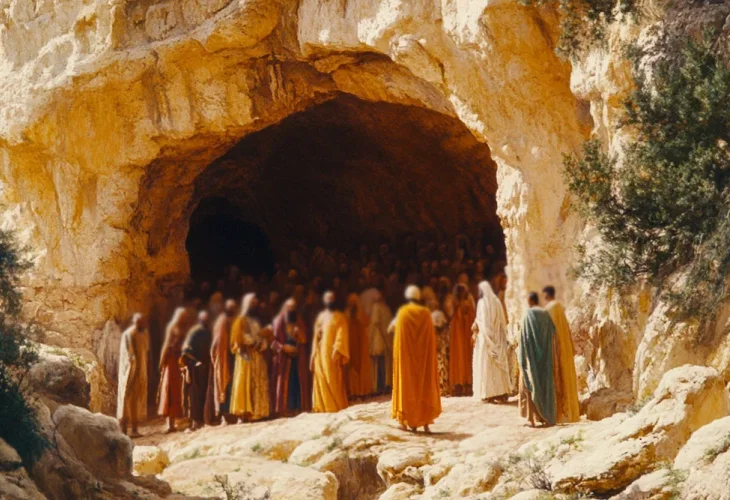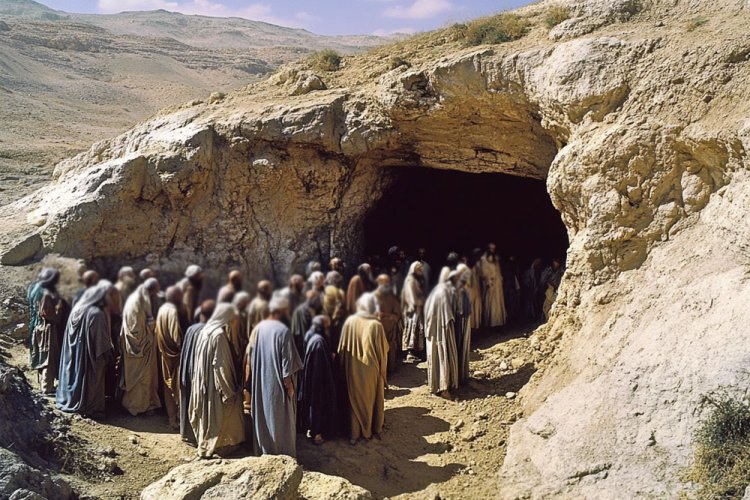Abraham's Legendary Purchase: The Surprising Story Behind the Cave of Machpelah
Exploring ancient Hittite laws sheds light on the biblical narrative of Abraham's acquisition of the Cave of Machpelah. What seems peculiar at first glance—all the discussions, negotiations, and rituals—actually aligns with the customs of the time.
 An illustration of Abraham negotiating with the "Sons of Heth" at the entrance to the Cave of Machpelah (symbolically), in broad daylight.
An illustration of Abraham negotiating with the "Sons of Heth" at the entrance to the Cave of Machpelah (symbolically), in broad daylight.When our matriarch Sarah passed away, Abraham went "to mourn for Sarah and to weep for her." According to ancient tradition, it was he who composed the song "Eshet Chayil," found in the book of Proverbs, which we sing every Friday night in honor of the lady of the house.
Amid his mourning, Abraham acquired his first piece of land in the Holy Land, marking the Jewish people's initial ownership foothold in Israel. Hebron was already an ancient city, older than Zoan of Egypt according to the Torah. Founded by four giants, it was also called "Kiryat Arba," with the most prominent one among them named "Arba." In Hebron, Abraham's allies—Aner, Eshkol, and Mamre—lived, although seemingly outside the Hittite city limits, in areas like the "Oaks of Mamre."
According to Torah, the inhabitants were the sons of Heth, a once-great but now obscure civilization. Before archaeological discoveries, historians knew little of the Hittites. In 1906, three and a half millennia after Abraham’s acquisition, German archaeologist Hugo Winckler excavated in the Turkish village of Boğazköy, discovering remains of a vast empire's capital city and its archives. These archives revealed 14,000 clay documents, bringing to light an empire that history had all but forgotten, except in the Torah.
According to some interpretations, Tidal, one of the kings Abraham fought, founded this empire. It reached its peak during Abraham's time and was prevalent in Canaan, declining around the Japanese arrival, with the Philistines' invasions.

Thanks to the rediscovered archives, we now have insights into Hittite history, culture, beliefs, and laws.
Exploring ancient Hittite laws sheds light on the biblical narrative of Abraham's acquisition of the Cave of Machpelah from the "Sons of Heth." All the rituals, discussions with elders, tree marking, the full field purchase, and haggling fit "by the book."
According to Hittite law, landowners paid taxes based on their field's productivity. The royal archives kept a list of landowners. Hittite law stipulated that buying a mere portion of a field exempted one from such taxes, leaving the burden on the primary owner. Understanding this, Abraham initially requested just the cave, located at the field's edge, as he didn't intend to settle in Hebron. He felt it holy, knowing the patriarchs of humanity rested therein, and desired it for his descendants. Yet, Ephron, the seller, insisted Abraham buy the whole field, shifting the tax burden and pitching it as a gift: "The field I give you; it's yours..."
Why mention "all the trees in the field" during the sale? This highlights an intriguing rule found in Hittite law, which required land sales to specify the number of trees. Natural borders could blur amid disaster or conflict, but tree counts ensured clarity. Thus, Ephron adhered to such lawful procedures.
Hittite law also dictated purchase customs, wherein payments required full, commercial-grade currency, "silver – fully negotiable," as the Torah specifies. Transactions occurred publicly, with "the people of the land" present. Without personal ownership documents and widespread literacy, public witness ensured acknowledgment of property transfers for generations.
Abraham, wise in his dealings, mastered the local customs of the Hittite "people of the land." He knew these moments with Ephron the shrewd laid the cornerstone of settling the land of Israel, making the purchase of Machpelah symbolic and integral. This site remains sacred, with yearly gatherings like the joyful Simchat Beit HaShoeva and the thousands attending Parashat Chayei Sarah in commemoration. Though the Hittites vanished from the historical scene, the Jews persist in Israel. Forever.

